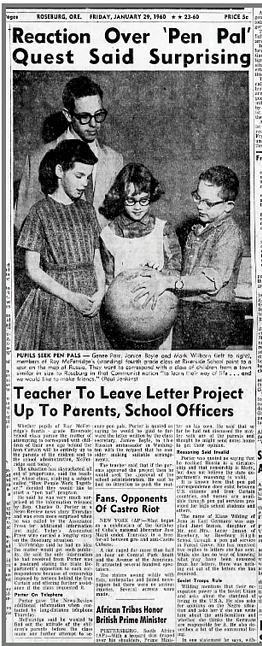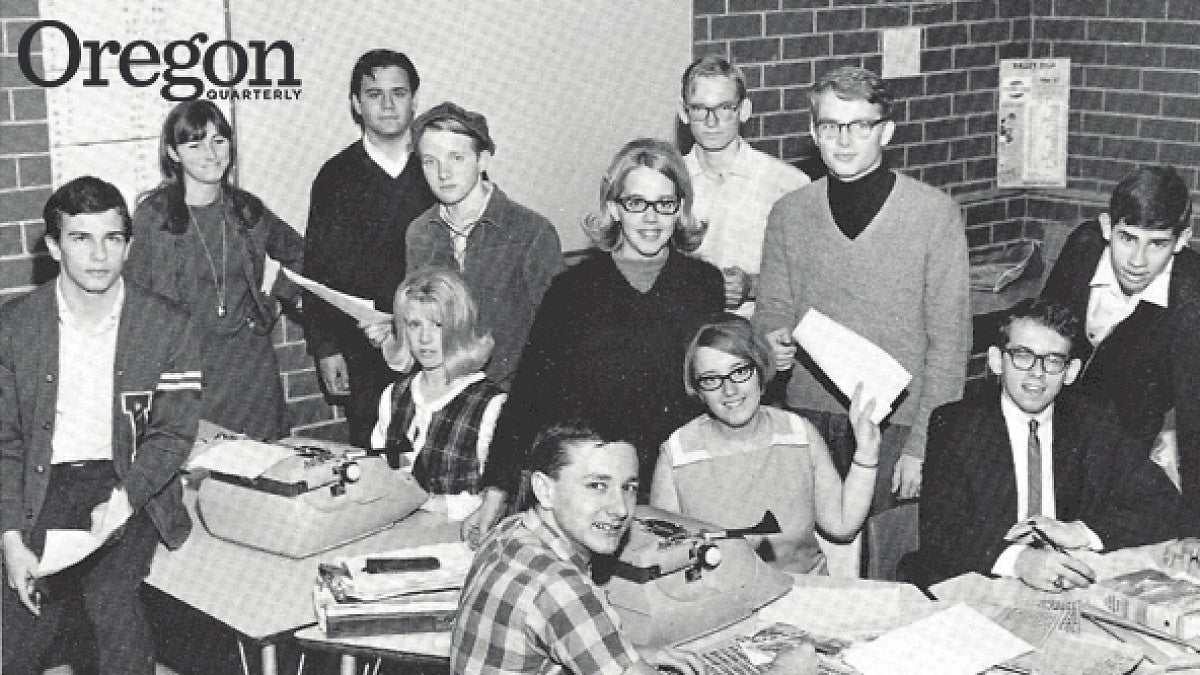Some of the most memorable educators are the ones willing to throw out the syllabus in pursuit of a higher lesson.
When a fourth-grade teacher in Roseburg, Oregon, did just that during the height of the Cold War, he sent the US state department and J. Edgar Hoover’s FBI into a tizzy.
In a search for pen pals from the farthest-away place they could imagine, teacher Ray McFetridge in 1959 had students write to their congressman, longtime Eugene resident Charles Porter, in hopes he could help them establish correspondence with a grade-school class in the Soviet Union.
Porter dutifully took the idea to the state department, which responded with ambivalence, and there the project died.
RELATED LINKS
But the class’s effort triggered news stories and editorials—not just in the Roseburg News-Review but also the New York Times and even the Russian paper Pravda—and the school district was inundated by letters. Some expressed concern about possible Soviet propaganda in American classrooms; others decried the government’s stonewalling of a simple class project.
But after the class’s 15 minutes of fame, the pen pal project was dead—until it showed up again in the New York Times’ “On This Day” column in January 2019.
As journalism students at the University of Oregon, we learned about the story when Professor Peter Laufer, James N. Wallace Chair of Journalism, brought the column into class soon after to test our reporting skills. Could we locate the elementary student named in the column? Could we get her to talk to us about the pen pal affair?
We found her—and when we called her to discuss her moment in the limelight, we completed the assignment. But we also found a multifaceted, forgotten story about borders, governmental overreach, and propaganda.

We started with disparate, disjointed articles written by Laufer’s reporting class students. But curiosity called us to continue beyond the classroom, and a cohort of nine students was soon meeting regularly, working long after the class had ended.
We dug through archives and through decades for new leads and neglected government files. We strung our distinct stories into a narrative that explored what exactly happened in that rural Oregon classroom in the throes of the Red Scare. We examined how the incident might resonate now that the Iron Curtain has fallen but new walls—from figurative political tensions to a literal US border wall—have risen.
“We are not writing a book!” our stalwart professor kept reminding us, even as he pushed our manuscript to publishing houses. We’re not writing a book; we’re telling a story. We’re not writing a book; we’re just throwing away the syllabus.
That story became the collaborative, investigative reporting book, Classroom 15, published internationally by Anthem Press in January. It’s a story quite literally ripped from the footnotes of history that nonetheless embraces the bleeding edge of the modern political landscape—misinformation, xenophobia, propaganda. It explores that fear of the “other,” but also the dogged desire to connect and communicate and understand.
The project culminated in a 21st-century revival of the pen pal project that never was. We collected new letters from Southern Oregon fourth graders—pencil-and-crayon missives about Oregon rain and Marcus Mariota—and this time made sure those letters arrived at the farthest-away place they could imagine. Closing a 60-year loop, lead author Zack Demars arrived in December 2019 at Gymnazium 14, a primary school in Rostov-on-Don, Russia, with the new letters.
“The students I met were most excited when I put my Instagram handle on the whiteboard and they all got to ‘follow’ me,” Demars says. “In my head, that ability to connect is what the fourth graders of 1960 would’ve been most excited about, too.”
—By Julia Mueller, BA ’20 (Clark Honors College, journalism), and Zack Demars, BS '20 (journalism, political science)
Julia Mueller was managing editor for Classroom 15: How the Hoover FBI Censored the Dreams of Innocent Oregon Fourth Graders. Zack Demars was lead author. Visit linktr.ee/classroom15book for more information or to buy the book.
Images courtesy of Julia Mueller and Zack Demars


